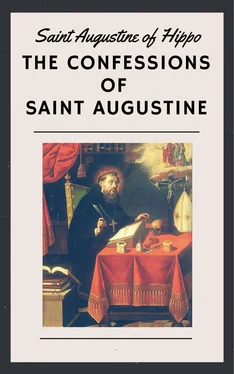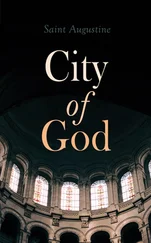To these words I should have listened more attentively, and being severed for the kingdom of heaven's sake, had more happily awaited Thy embraces; but I, poor wretch, foamed like a troubled sea, following the rushing of my own tide, forsaking Thee, and exceeded all Thy limits; yet I escaped not Thy scourges. For what mortal can? For Thou wert ever with me mercifully rigorous, and besprinkling with most bitter alloy all my unlawful pleasures: that I might seek pleasures without alloy. But where to find such, I could not discover, save in Thee, O Lord, who teachest by sorrow, and woundest us, to heal; and killest us, lest we die from Thee. Where was I, and how far was I exiled from the delights of Thy house, in that sixteenth year of the age of my flesh, when the madness of lust (to which human shamelessness giveth free licence, though unlicensed by Thy laws) took the rule over me, and I resigned myself wholly to it? My friends meanwhile took no care by marriage to save my fall; their only care was that I should learn to speak excellently, and be a persuasive orator.
For that year were my studies intermitted: whilst after my return from Madaura (a neighbour city, whither I had journeyed to learn grammar and rhetoric), the expenses for a further journey to Carthage were being provided for me; and that rather by the resolution than the means of my father, who was but a poor freeman of Thagaste. To whom tell I this? not to Thee, my God; but before Thee to mine own kind, even to that small portion of mankind as may light upon these writings of mine. And to what purpose? that whosoever reads this, may think out of what depths we are to cry unto Thee. For what is nearer to Thine ears than a confessing heart, and a life of faith? Who did not extol my father, for that beyond the ability of his means, he would furnish his son with all necessaries for a far journey for his studies' sake? For many far abler citizens did no such thing for their children. But yet this same father had no concern how I grew towards Thee, or how chaste I were; so that I were but copious in speech, however barren I were to Thy culture, O God, who art the only true and good Lord of Thy field, my heart.
But while in that my sixteenth year I lived with my parents, leaving all school for a while (a season of idleness being interposed through the narrowness of my parents' fortunes), the briers of unclean desires grew rank over my head, and there was no hand to root them out. When that my father saw me at the baths, now growing towards manhood, and endued with a restless youthfulness, he, as already hence anticipating his descendants, gladly told it to my mother; rejoicing in that tumult of the senses wherein the world forgetteth Thee its Creator, and becometh enamoured of Thy creature, instead of Thyself, through the fumes of that invisible wine of its self-will, turning aside and bowing down to the very basest things. But in my mother's breast Thou hadst already begun Thy temple, and the foundation of Thy holy habitation, whereas my father was as yet but a Catechumen, and that but recently. She then was startled with a holy fear and trembling; and though I was not as yet baptised, feared for me those crooked ways in which they walk who turn their back to Thee, and not their face.
Woe is me! and dare I say that Thou heldest Thy peace, O my God, while I wandered further from Thee? Didst Thou then indeed hold Thy peace to me? And whose but Thine were these words which by my mother, Thy faithful one, Thou sangest in my ears? Nothing whereof sunk into my heart, so as to do it. For she wished, and I remember in private with great anxiety warned me, "not to commit fornication; but especially never to defile another man's wife." These seemed to me womanish advices, which I should blush to obey. But they were Thine, and I knew it not: and I thought Thou wert silent and that it was she who spake; by whom Thou wert not silent unto me; and in her wast despised by me, her son, the son of Thy handmaid, Thy servant. But I knew it not; and ran headlong with such blindness, that amongst my equals I was ashamed of a less shamelessness, when I heard them boast of their flagitiousness, yea, and the more boasting, the more they were degraded: and I took pleasure, not only in the pleasure of the deed, but in the praise. What is worthy of dispraise but vice? But I made myself worse than I was, that I might not be dispraised; and when in any thing I had not sinned as the abandoned ones, I would say that I had done what I had not done, that I might not seem contemptible in proportion as I was innocent; or of less account, the more chaste.
Behold with what companions I walked the streets of Babylon, and wallowed in the mire thereof, as if in a bed of spices and precious ointments. And that I might cleave the faster to its very centre, the invisible enemy trod me down, and seduced me, for that I was easy to be seduced. Neither did the mother of my flesh (who had now fled out of the centre of Babylon, yet went more slowly in the skirts thereof as she advised me to chastity, so heed what she had heard of me from her husband, as to restrain within the bounds of conjugal affection, if it could not be pared away to the quick) what she felt to be pestilent at present and for the future dangerous. She heeded not this, for she feared lest a wife should prove a clog and hindrance to my hopes. Not those hopes of the world to come, which my mother reposed in Thee; but the hope of learning, which both my parents were too desirous I should attain; my father, because he had next to no thought of Thee, and of me but vain conceits; my mother, because she accounted that those usual courses of learning would not only be no hindrance, but even some furtherance towards attaining Thee. For thus I conjecture, recalling, as well as I may, the disposition of my parents. The reins, meantime, were slackened to me, beyond all temper of due severity, to spend my time in sport, yea, even unto dissoluteness in whatsoever I affected. And in all was a mist, intercepting from me, O my God, the brightness of Thy truth; and mine iniquity burst out as from very fatness.
Theft is punished by Thy law, O Lord, and the law written in the hearts of men, which iniquity itself effaces not. For what thief will abide a thief? not even a rich thief, one stealing through want. Yet I lusted to thieve, and did it, compelled by no hunger, nor poverty, but through a cloyedness of well-doing, and a pamperedness of iniquity. For I stole that, of which I had enough, and much better. Nor cared I to enjoy what I stole, but joyed in the theft and sin itself. A pear tree there was near our vineyard, laden with fruit, tempting neither for colour nor taste. To shake and rob this, some lewd young fellows of us went, late one night (having according to our pestilent custom prolonged our sports in the streets till then), and took huge loads, not for our eating, but to fling to the very hogs, having only tasted them. And this, but to do what we liked only, because it was misliked. Behold my heart, O God, behold my heart, which Thou hadst pity upon in the bottom of the bottomless pit. Now, behold, let my heart tell Thee what it sought there, that I should be gratuitously evil, having no temptation to ill, but the ill itself. It was foul, and I loved it; I loved to perish, I loved mine own fault, not that for which I was faulty, but my fault itself. Foul soul, falling from Thy firmament to utter destruction; not seeking aught through the shame, but the shame itself!
For there is an attractiveness in beautiful bodies, in gold and silver, and all things; and in bodily touch, sympathy hath much influence, and each other sense hath his proper object answerably tempered. Worldy honour hath also its grace, and the power of overcoming, and of mastery; whence springs also the thirst of revenge. But yet, to obtain all these, we may not depart from Thee, O Lord, nor decline from Thy law. The life also which here we live hath its own enchantment, through a certain proportion of its own, and a correspondence with all things beautiful here below. Human friendship also is endeared with a sweet tie, by reason of the unity formed of many souls. Upon occasion of all these, and the like, is sin committed, while through an immoderate inclination towards these goods of the lowest order, the better and higher are forsaken,—Thou, our Lord God, Thy truth, and Thy law. For these lower things have their delights, but not like my God, who made all things; for in Him doth the righteous delight, and He is the joy of the upright in heart.
Читать дальше












